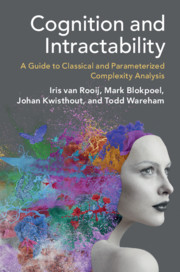Book contents
- Frontmatter
- Contents
- List of Figures
- List of Tables
- Preface
- Part I Introduction
- 1 Introduction
- Part II Concepts and Techniques
- Part III Reflections and Elaborations
- Part IV Applications
- Appendix A Mathematical Background
- Appendix B List of Computational Problems
- Appendix C Compendium of Complexity Results
- References
- Index
1 - Introduction
from Part I - Introduction
Published online by Cambridge University Press: 18 April 2019
- Frontmatter
- Contents
- List of Figures
- List of Tables
- Preface
- Part I Introduction
- 1 Introduction
- Part II Concepts and Techniques
- Part III Reflections and Elaborations
- Part IV Applications
- Appendix A Mathematical Background
- Appendix B List of Computational Problems
- Appendix C Compendium of Complexity Results
- References
- Index
Summary
In this chapter we introduce the motivation for studying "cognition and intractability." We provide an intuitive introduction to the problem of intractability as it arises for models of cognition using an illustrative every day problem as running example: selecting toppings on a pizza. Next, we review relevant background information about the conceptual foundations of cognitive explanation, computability and tractability. At the end of this chapter the reader should have a good understanding of the conceptual foundations of the Tractable Cognition thesis, including its variants: The P-Cognition thesis and the FPT-Cognition thesis, which motivates diving into the technical concepts and proof techniques covered in Chapters 2–7.
Information
- Type
- Chapter
- Information
- Cognition and IntractabilityA Guide to Classical and Parameterized Complexity Analysis, pp. 3 - 22Publisher: Cambridge University PressPrint publication year: 2019
